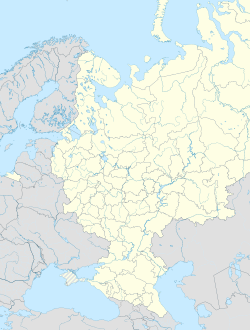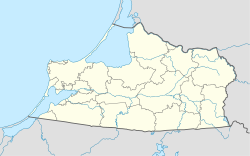Romanowo (Kaliningrad)
| settlement
Romanowo
Pobethen Романово
|
||||||||||||||||||||||||||||
|
||||||||||||||||||||||||||||
|
||||||||||||||||||||||||||||
Romanowo ( Russian Романово , German Pobethen ) is a place in the Russian Oblast Kaliningrad in Zelenogradsk Raion . It belongs to the Zelenogradsk municipal self-government unit .
Geographical location
The village is located in the historical region of East Prussia , in the Sabawa valley (Pobethener Mühlenfließ) , 25 kilometers northwest of Königsberg ( Kaliningrad ) and nine kilometers southeast of Neukuhren ( Pionerski ).
The connection to the road network is provided by the A 192 trunk road . A main road leads from Romanowo in a northerly direction to the junction of Primorskoje Kolzo (coastal motorway ring) and further into the urban area of Pionerski. A side road leads in a south-easterly direction via Geroiskoje (Goythenen) and Rodniki (Radnicken) to Nisowka (Nadrau) on the main road from Kaliningrad via Cholmogorowka (Fuchsberg) to Selenogradsk (Cranz) .
Romanowo is a train station on the Kaliningrad – Swetlogorsk (Königsberg – Rauschen) railway , the former Samland Railway . Until 1945 this station was called Watzum -Pobethen .
history

The place previously called Pobethen is an old church village and was also an estate for a long time. The area was settled by the Balts as early as the Bronze Age . There was probably a Prussian fortification on the formerly so-called Hannchenberg . The place was first mentioned in 1258. In 1260, during the Prussian uprising, this was the main focus of the Samland resistance, which was broken in the battle of Pobethen with massive resistance from the Livonian Order of the Swords. Long after that the place remained a source of unrest, and the Prussian language and religion stayed here for a particularly long time.
After Pillau (now Russian: Baltijsk) and Fischhausen (Primorsk), Pobethen developed into what was once the most important place in Samland. There was a Kruger here as early as 1479, which was even allowed to make brandy into the 17th century.
On June 13, 1874, Pobethen became the seat and eponymous place of a newly established administrative district that existed until 1945 and belonged to the Fischhausen district - Samland district from 1939 to 1945 - in the Königsberg district of the Prussian province of East Prussia .
In 1910 there were 857 inhabitants in the village of Pobethen and 190 in the Pobethen manor. Both districts united on September 30, 1928 to form the new rural community of Pobethen, at the same time the rural community of Diewens (no longer existing today) was incorporated. In 1933 there were 1119 inhabitants here and in 1939 there were already 1359 inhabitants.
After the end of the Second World War , northern East Prussia and with it Pobethen were placed under Soviet administration. Pobethen was given the Russian name Romanowo in 1947 . At the same time the place became the seat of a village soviet in Primorsk Raion . From 2005 to 2015 Romanowo belonged to the rural municipality of Kovrovskoje selskoje posselenije and since then to the city district of Zelenogradsk.
District of Pobethen (1874–1945)
The newly established district of Pobethen was formed by seven rural communities (LG) and one manor district (GB) in 1874. In 1910, five rural communities and another manor district were reclassified from the Strobjehnen district (now in Russian: Kulikowo), which was in the process of being dissolved, to the Pobethen district:
| Surname | Russian name | Remarks |
|---|---|---|
| LG Diewens | 1928 incorporated into the rural community of Pobethen | |
| LG Goythenen | Geroiskoje | |
| LG Jaugehnen | 1928 incorporated into the rural community of Paggehnen | |
| LG lukewarm | ||
| LG Paggehnen | ||
| LG Pobethen | Romanowo | |
| LG Sorthenen | ||
| GB Pobethen | Romanowo | 1928 incorporated into the rural community of Pobethen |
| from 1910: | ||
| LG Barthenen | incorporated into the rural community of Biegiethen | |
| LG Biegiethen | ||
| LG Eisseln | Beregovoye | 1930 reclassified to the district of Grünhoff |
| LG Garbseiden | ||
| LG strobes | Kulikowo | incorporated into the rural community of Garbseiden |
| GB Kringitten | 1928 incorporated into the rural community of Sorthenen |
On January 1, 1945, the district of Pobethen still consisted of the seven communities Biegiethen, Garbseiden, Goythenen, Lauknicken, Paggehnen, Pobethen and Sorthenen.
Romanowski selski Sowet / okrug 1947–2005
The village soviet Romanowski selski sovet (ru. Романовский сельский Совет) was established in June 1947 in Primorsk Raion . After the collapse of the Soviet Union , the administrative unit existed as the village district Romanowski selski okrug (ru. Романовский сельский округ). In 2005 the remaining places in the village district were incorporated into the newly formed rural community Kowrowskoje selskoje posselenije .
| Place name | Name until 1947/50 | Remarks |
|---|---|---|
| Alexandrowka (Александровка) | Posselau | The place was renamed in 1947. |
| Aralskoye (Аральское) | Alexwangen | The place was renamed in 1950. The local branch Alexwangen was connected to the city of Svetlogorsk under the name Juschny before 1975 . |
| Beregovoe (Береговое) | Eisseln | The place was renamed in 1947 and abandoned before 1988. |
| Bobrowka (Бобровка) | (German) Battau | The place was renamed in 1950 and incorporated into the city of Svetlogorsk before 1975 . |
| Dubrovka (Дубровка) | Rain | The place was renamed in 1950. |
| Geroiskoje (Геройское) | Goythens | The place was renamed in 1950. |
| Gorbatowka (Горбатовка) | Nortycken | The town was renamed in 1947 and was first in the village Soviet Schatrowski classified. |
| Gorkovskoye (Горьковское) | Watzum | The place was renamed in 1950. |
| Yaroslavskoye (Ярославское) | Slack | The place was renamed in 1950 and abandoned before 1988. |
| Jasnovka (Ясновка) | Groß Ladtkeim | The place was renamed in 1947 and abandoned before 1975. |
| Kalinowo (Калиново) | Tolklauken | The place was renamed in 1950. |
| Kulikowo (Куликово) | Strobes | The place was renamed in 1947. |
| Ljotnoye (Лётное) | Tenkieten | The place was renamed in 1950. |
| Minskoye (Минское) | to Posselau | The place was renamed in 1950 and connected to Aralskoye before 1975. |
| Molochnoe (Молочное) | Klein Drebnau | The place was renamed in 1950. |
| Obuchowo (Обухово) | Lixeids | The place was renamed in 1950. |
| Olschanka (Ольшанка) | Obrotten | The place was renamed in 1950. |
| Panayevo (Панаево) | Gardwingen | The place was renamed in 1950 and probably abandoned around 1990. |
| Perowo (Перово) | Mogaiten and Ankrehnen | The place was renamed in 1947 and abandoned before 1988. |
| Pribreschnoe (Прибрежное) | Buckling | The place was renamed in 1947 and probably connected to the place Saostrowje before 1988. |
| Rogachovo (Рогачёво) | Lopsienen and Mossycken | The place was renamed in 1950. |
| Romanowo (Романово) | Pobethen | Administrative headquarters |
| Roshkowo (Рожково) | Kalthof | The place was renamed in 1950 and abandoned before 1975. |
| Rybnoye (Рыбное) | Lop wages | The place was renamed in 1950 and subordinated to the Pionerski City Soviet before 1975 . |
| Salskoye (Сальское) | Saint Lawrence | The town was renamed in 1947 and was first in the village Soviet Schatrowski classified. |
| Saostrowje (Заостровье) | Rantau | The place was renamed in 1947. |
| Seljony Gai (Зелёный Гай) | Great Drebnau | The place was renamed in 1950. |
| Swetlowo (Светлово) | to St. Lawrence | The place was renamed in 1950. |
| Ternovka (Терновка) | Perteltnicken and Suppliethen | The place was renamed in 1950 and abandoned before 1975. |
| Tumanowka (Тумановка) | Kotzlauken | The place was renamed in 1947 and abandoned before 1975. |
| Wetkino (Веткино) | Steam | The place was renamed in 1947. |
| Wolodino (Володино) | Woytnod | The place was renamed in 1947 and abandoned before 1975. |
The three towns of Rodniki (Radnicken) , Roschtschino (Grünhoff) and Schumnoje (Schuphnen) , which were renamed in 1947 and which were initially also included in the Romanowski selski Sowet, then (before 1975) came to the Wischnjowski selski Sowet .
House Pobethen
In 1262 the Prussian Landmeister Helmerich von Rechenberg had the "House Pobethen" built on a headland in the mill pond north-west of Pobethen. It was destroyed by a Lithuanian invasion in 1283 and 1289, but was soon rebuilt - this time made of stone. This castle was destroyed in the peasant uprising under Hans Gericke in 1525 and was not rebuilt.
In 1912 the community began to extract road construction material from individual parts of the ruins. The state curator protested and managed to save at least the already uncovered foundations of the eastern main house.
church
→ See main article (with parish and pastor list): Church Pobethen
Church building
The Pobethener Church is a building from the 14th century, a plastered field stone building with a stream stone frame. It survived the Second World War unscathed, but was then structurally changed so that today only the ruins of the tower, the choir and other outer walls are preserved. The building cannot currently be used for church purposes.
Parish
Pobethen was already a church village in the pre-Reformation period. The Reformation gained a foothold here very early, as a Lutheran cleric was already serving here in 1520. Until 1945 Pobethen with its 36 parish places belonged to the parish of Fischhausen (today Russian: Primorsk) within the church province of East Prussia of the Church of the Old Prussian Union . Today Romanowo is located in the catchment area of the Evangelical Lutheran congregation in Zelenogradsk (Cranz) , a branch congregation of the Resurrection Church in Kaliningrad (Königsberg) within the Kaliningrad provost of the Evangelical Lutheran Church of European Russia .
school
There was already a school in Pobethen at the time of the Reformation . In connection with the reorganization of rural schools, King Friedrich Wilhelm I built a school at the beginning of the 18th century. Around 1900 the Pobethener School had six classes.
Personalities of the place
Sons and daughters of the place
- Wolfgang Radtke (born February 13, 1942 in Pobethen), German medieval historian
Connected to the place
- Abel Will , pastor in Pobethen from 1540 to 1575, translated Martin Luther's catechism into the Old Prussian language
- Adolf Rogge (1827–1886), pastor in Pobethen from 1856 to 1861, German theologian and local historian
literature
- Karl Emil Gebauer : Customer of the Samland or history and topographical-statistical picture of the East Prussian landscape Samland . Königsberg 1844, pp. 99-100.
Web links
Individual evidence
- ↑ Itogi Vserossijskoj perepisi naselenija 2010 goda. Kaliningradskaya oblastʹ. (Results of the 2010 all-Russian census. Kaliningrad Oblast.) Volume 1 , Table 4 (Download from the website of the Kaliningrad Oblast Territorial Organ of the Federal Service for State Statistics of the Russian Federation)
- ^ Location information East Prussia picture archive: Pobethen
- ↑ a b History and the Pobethen House at ostpreussen.net
- ↑ a b Rolf Jehke, Pobethen district
- ^ Uli Schubert, community directory, Fischhausen district
- ^ Michael Rademacher: German administrative history from the unification of the empire in 1871 to the reunification in 1990. Samland district. (Online material for the dissertation, Osnabrück 2006).
- ↑ a b The Указ Президиума Верховного Совета РСФСР от 17 июня 1947 г. "Об образовании сельских советов, городов и рабочих поселков в Калининградской области" (Decree of the Presidium of the Supreme Soviet of the RSFSR of 17 June 1947: On the Formation of village Soviets , Cities and workers' settlements in Kaliningrad Oblast)
- ↑ Only Mogaiten was renamed.
- ^ Evangelical Lutheran Provosty of Kaliningrad ( Memento of August 29, 2011 in the Internet Archive )


